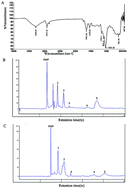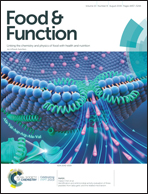Cordyceps militaris polysaccharides exerted protective effects on diabetic nephropathy in mice via regulation of autophagy
Abstract
The present study was designed to investigate the protective effects of Cordyceps militaris polysaccharides (CMP) on STZ-treated DN mice. CMP were identified by FT-IR and HPLC. Diabetic nephropathy (DN) was induced in male C57BL/6 mice by the injection of streptozotocin (STZ, 50 mg kg−1) in citrate buffer on 5 consecutive days. Administration of CMP at 200 and 400 mg kg−1 or irbesartan at 60 mg kg−1 in the STZ-treated mice could prevent the damage caused by STZ. CMP significantly reduced the STZ-induced higher expression of the kidney index, TC, TG, MDA, urinary protein, Scr, and BUN, while it markedly increased the STZ-induced decrease in GSH levels compared with the DN group. Histopathology analysis of the kidney by PAS, Masson, and HE staining confirmed the renal injury induced by STZ and the protective effects of CMP. Transmission electron microscopy (TEM) results confirmed the severe foot process effacement induced by STZ, but CMP treatment inhibited the podocytes’ structure defects and ameliorated the function of podocytes. Desmin was measured by immunofluorescence and was related to podocyte injury. The results showed that CMP lessened the expression of desmin induced by STZ. CD68 expression was measured by immunohistochemistry analysis, and the expressions of IL-1β, IL-6, and MCP-1 mRNA were measured by qRT-PCR. The results showed that CMP suppressed the expressions of CD68, IL-1β, IL-6, and MCP-1 mRNA induced by STZ. The role of autophagy in the treatment of DN mice with CMP was detected by TEM and western blotting. The results showed that the administration of CMP was able to overcome the STZ-treated autophagy deficiency, significantly increase the rate of autophagy in the kidney, promote the expression of Atg5, beclin1 and LC3 protein, and reduce the expression of p62 protein. In conclusion, the present study demonstrates that CMP exert a protective effect on DN in STZ-treated mice possibly via activation of autophagy.



 Please wait while we load your content...
Please wait while we load your content...